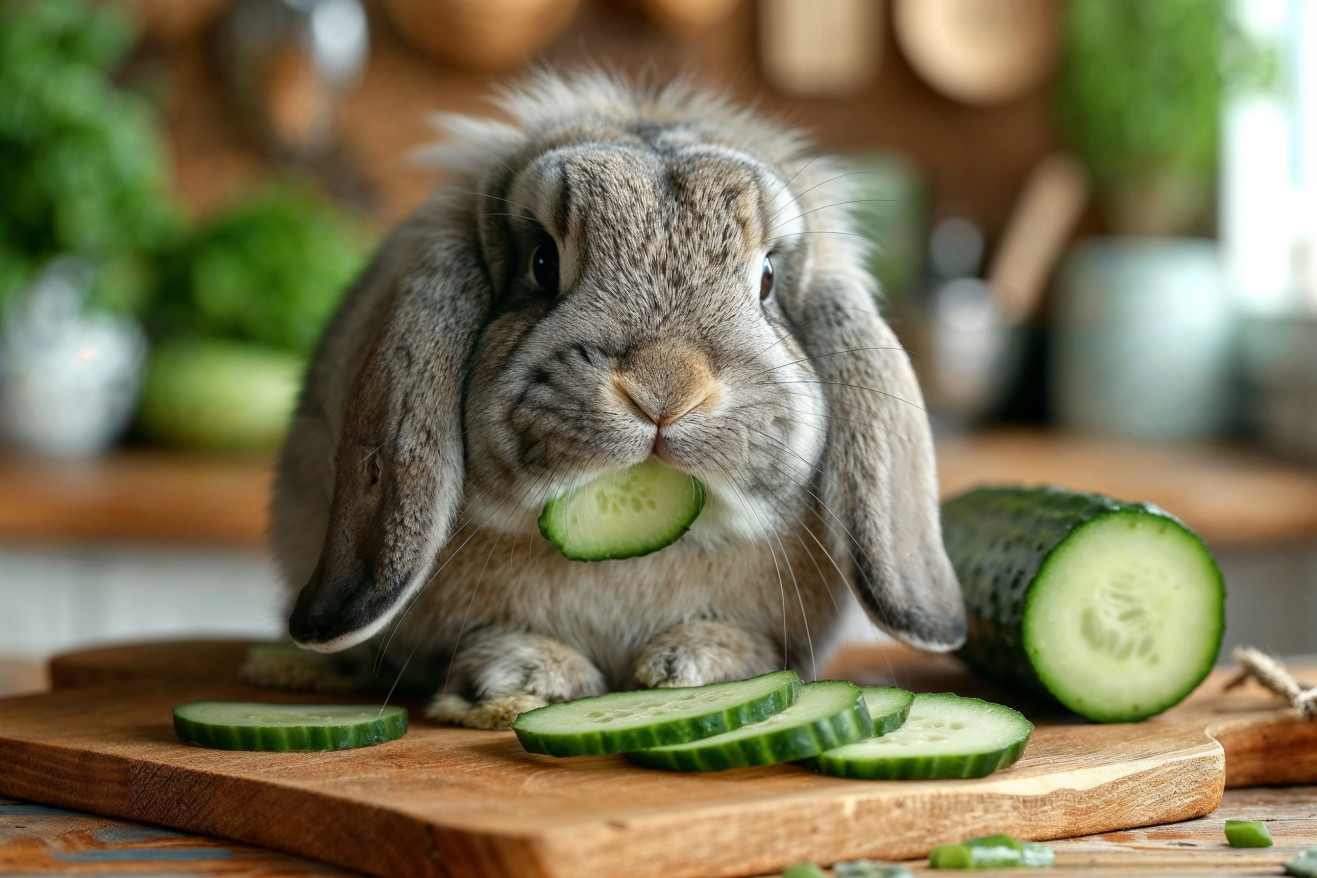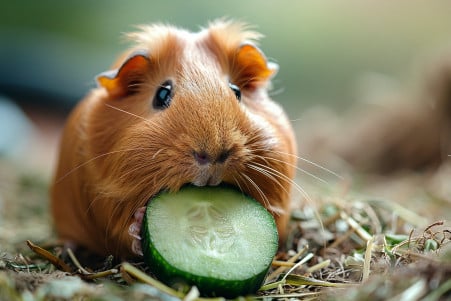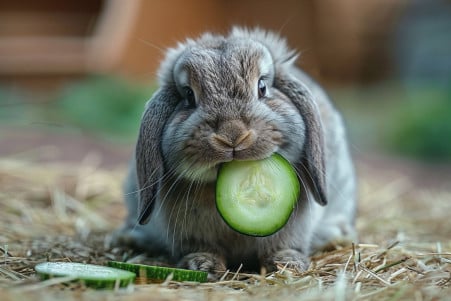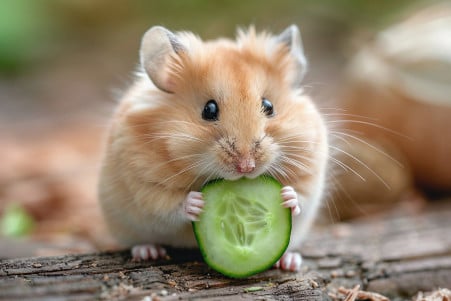Can Rabbits Eat Cucumbers? A Guide to Safe Snacking
29 January 2024

Cucumbers are a popular snack for humans, but can rabbits eat them too? The short answer is yes, rabbits can eat cucumbers, but there are some important things to keep in mind. Cucumbers can be a healthy, hydrating snack for rabbits when fed in moderation. However, they should only be a small part of a rabbit’s diet, which should primarily consist of hay, greens, and pellets.
You can feed your rabbit a few slices of cucumber a couple of times a week, but you should introduce them slowly.
To help you make the best choices for your rabbit, we’ll take a deep dive into the latest research on rabbit nutrition and physiology. Drawing on research from veterinary medicine and animal nutrition, we’ll help you understand which fresh foods are helpful and which may be harmful.
We’ll pay special attention to the rabbit’s digestive system, how it works, and how it interacts with foods like cucumbers, as well as the best ways to ensure your rabbit’s diet is varied and balanced to support their overall health and well-being.
Can rabbits eat cucumbers?
Cucumber’s Nutritional Profile for Rabbits
Cucumbers are known for their high water content, which is typically around 95%, so they are a great way to help your rabbit stay hydrated. A half-cup serving of cucumber with the skin on contains just 8 calories, according to Verywell Fit, so it’s a low-calorie, low-carb, and low-fat snack. This can be especially helpful for rabbits who need to up their water intake or for rabbits who need to stay hydrated in the heat.
However, cucumbers are not nutritionally dense. They do contain important vitamins, including vitamin K, which is important for rabbits’ bone health and blood clotting, according to Medical News Today. That said, cucumbers are not a good source of nutrition for rabbits because they don’t contain the full range of vitamins and minerals that rabbits need.
Cucumbers also have less fiber than other vegetables that rabbits eat, and fiber is an important part of a rabbit’s diet. According to Healthline, cucumbers contain soluble fiber, but they don’t contain enough to meet a rabbit’s needs. As a result, while cucumbers can be a nutritious treat, they shouldn’t be used to replace high-fiber foods like hay and leafy greens, which are essential to a rabbit’s diet.
How to Tailor Your Rabbit’s Diet: Where Cucumbers Fit In
Knowing what rabbits need to eat to stay healthy is important for making sure they live long, happy lives. Rabbits require a high-fiber diet, which is important for their digestive health. The Merck Veterinary Manual explains that rabbits should be fed a diet that is at least 20% to 25% fiber, with most of that fiber coming from hay, which provides the non-digestible fiber that’s necessary for gastrointestinal motility.
In addition to hay, a well-rounded diet includes a mix of leafy greens and a small amount of pellets to ensure that rabbits get all the nutrients they need.
While cucumbers are hydrating and low in calories, they don’t offer the high levels of fiber that rabbits need. That said, cucumbers can be used as a low-calorie treat in a rabbit’s diet. VCA Animal Hospitals explains that fresh vegetables can be included in a rabbit’s diet, but they should be introduced gradually and in small amounts to make sure that rabbits don’t have any trouble digesting them.
If you want to give your rabbit cucumbers, it’s best to do so in moderation, offering no more than a few small slices a week. This way, you can make sure that your rabbit is still eating plenty of hay and leafy greens, which are important for their health.
Rabbit.org notes that treats, including cucumbers, should make up no more than 5% of a rabbit’s diet. If you follow these rules, you can make sure that your rabbit’s diet is well-rounded enough to avoid nutritional deficiencies while still giving them the treats they need to stay happy and healthy.
Gradual Greens: How to Feed Your Rabbit Cucumbers
When feeding your rabbit cucumbers, it’s important to introduce them slowly to avoid digestive problems. The People’s Dispensary for Sick Animals (PDSA) recommends starting with a small piece of cucumber to see if your rabbit is interested and how they react to it. If your rabbit doesn’t have any digestive issues, you can increase the amount of cucumber you give them over the next few days.
The San Diego House Rabbit Society warns that rabbits have sensitive digestive systems and that sudden changes in their diet can lead to health issues like GI Stasis. Small Pet Select recommends a transition period of two to four weeks, during which you can slowly introduce new foods like cucumbers.
Watch for signs of digestive upset, such as changes in your rabbit’s poop, gas, or a lack of energy. If you notice any of these symptoms, it’s best to stop introducing new foods and talk to your vet.
To make sure the cucumbers you give your rabbit are safe, make sure to buy organic cucumbers or wash them thoroughly to remove any pesticide residue. This slow introduction will help you learn more about your rabbit’s diet and how cucumbers can fit into it without causing digestive problems.
How a Rabbit’s Digestive System Works
Rabbits have a unique digestive system that has evolved to efficiently process fibrous plant material. Because of this, they are herbivores and need a diet that is high in fiber to keep their digestive systems running smoothly.
According to Supreme Petfoods, the rabbit’s large cecum, which is part of the digestive system, contains microbes that ferment fiber, allowing the rabbit to extract the nutrients it needs. This process is so important that rabbits will eat cecotropes, which are nutrient-rich droppings, directly from their bodies to make sure they get all the nutrients they need.
Companion Animals notes that rabbits have a delicate digestive system and that new foods should be introduced slowly to avoid upsetting their stomachs. While cucumbers can help rabbits stay hydrated because they are mostly water, Veterinary Clinics: Exotic Animal Practice points out that they don’t have the fiber that is necessary for a rabbit’s gut motility and cecum function.
Cecotropes are an important part of a rabbit’s diet. The rabbit’s cecum produces these special droppings, which are full of vitamins and minerals, as it ferments fiber that the rabbit didn’t absorb the first time it went through the digestive system.
This means that rabbits need to eat a diet that is high in hay and greens to make sure they produce cecotropes and keep their digestive systems working as they should.
This is why cucumbers should be given to rabbits as a treat and not as a regular part of their diet so that their digestive systems can continue to work as they should.
Conclusion: Can Rabbits Eat Cucumbers?
In conclusion, rabbits can eat cucumbers, but only as an occasional treat and not a regular part of their diet. As we’ve discussed, cucumbers can help keep rabbits hydrated and are low in calories, but they should not make up more than 5% of a rabbit’s daily food intake to avoid digestive problems and nutritional deficiencies, according to Rabbit Care Tips.
Rabbits’ diets should be high in fiber, with a base of hay and a mix of leafy greens and a small amount of pellets.
Knowing what your rabbit needs in their diet is important for their health. Giving your rabbit a slice of cucumber every once in a while can help keep their diet interesting and keep them hydrated, especially in the summer months, according to Central Victoria Hay. However, it’s important to remember that cucumbers should be fed in moderation and introduced slowly to avoid upsetting your rabbit’s stomach, according to The Nature Trail.
If you’re thinking about adding cucumbers or any other new food to your rabbit’s diet, it’s always a good idea to do some additional research and talk to your vet. This will help ensure that you get advice that’s tailored to your rabbit’s specific needs.
And don’t forget that hay, leafy greens, and pellets should always be the main components of your rabbit’s diet—they are the key to keeping your rabbit healthy and happy.


